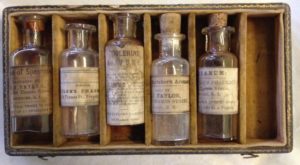
18th century apothecary bottles (31.14.1 A-E, Collection of the Newport Historical Society)
The deadly virus that causes smallpox had been crossing the globe since ancient times, but it was not until 1796 that the first successful vaccine was introduced after many years of trial-and-error inoculation experiments. People in 18th century New England also practiced the measures we are hearing about today as the world combats COVID-19: handwashing and social distancing. There is no vaccine, yet, for COVID-19 but we know that scientists are working on it. We also know that public will debate, as they always have, the safety and effectiveness of vaccines.
In 1776, at a June session the Rhode Island General Assembly voted to permit inoculation for smallpox in Rhode Island. John G. Wanton of Newport was one of 10 Assembly members who protested against the bill’s passage. Among the reasons cited were that the community had not been fully informed, the process had been abandoned in other places, and, more interestingly, that a provision had not been made for the poor who were by far the most numerous in the community.
The historical example teaches us that public health initiatives are often fraught, and sometimes opposed for all kinds of reasons, issues of education and access included. But, as science advances, so does the efficacy of these measures. Thanks to a global collaborative vaccination policy, smallpox was declared eradicated in 1980.
Banner: Family record from an early 19th century bible that shows birth and inoculation dates, from the collection of the Newport Historical Society.